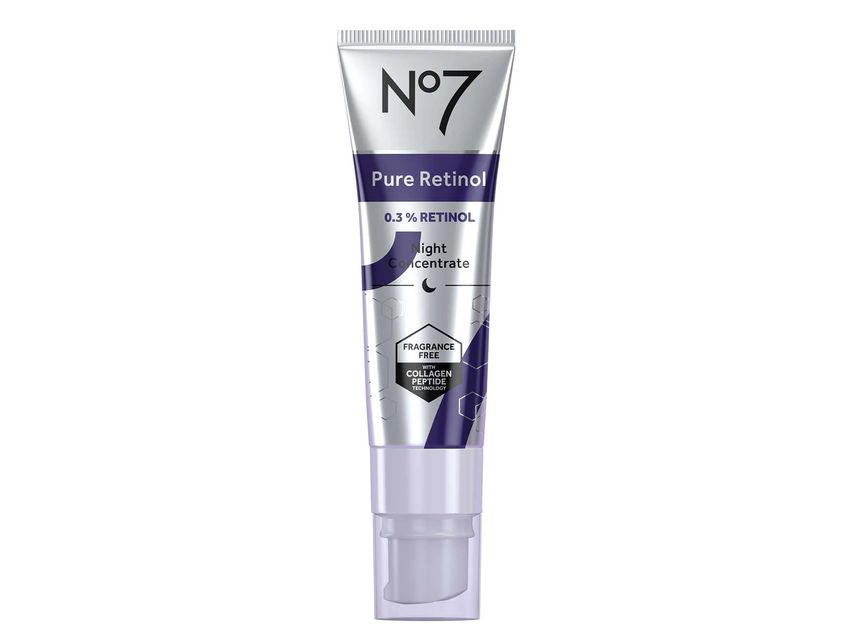Vitamin A
There are many types of vitamin A but the most common one in skincare is retinol. Used at night (but never in the morning) in tandem with daily SPF, vitamin A derivatives such as retinol and retinoic acid stimulate collagen production and increase cell turnover, meaning they target the signs of ageing and can help reduce acne scarring. Be cautious: these ingredients must be used with caution since as they can cause irritation, redness or flaky skin at first. Experts advise starting with a low concentration such as 0.1% or 0.2% and work your way up to higher doses once your skin has acclimatised. It’s much easier to take things slowly, and to build up; once skin gets ‘burnt’, it can take weeks for it to heal. Despite the caution, it’s a bit of a hero product for many skincare lovers, refreshing the appearance of dull-looking skin and helping to clear acne.
Vitamin B3
You may know B3 as niacinamide and this powerful ingredient can help treat acne or the dreaded fine lines thanks to its ability to combat inflammation and improve the skin barrier. With antioxidant effects, it’ll help reduce redness – meaning it’s ideal for those with rosacea – and pigmentation. But the positives don’t end there: niacinamide can help reduce wrinkles (hurrah!) and regulate sebum (rejoice all those with oilier skin) – and it’s safe to use during pregnancy.
Vitamin B5
This beauty holds moisture in the skin, supporting barrier function. It also boasts anti-inflammatory properties alongside smoothing and skin soothing abilities. It’s suitable for all skin types for especially apt for those with dehydrated or dry skin. Pantothenic acid has a number of benefits for the skin but is difficult to use in skincare thanks to its naturally unstable nature – until when teamed with Provitamin B5 (panthenol) which, once it penetrates the skin, converts to vitamin B5. Cue moist, flexible skin that’s soothed and repairing, panthenol is found in after-sun lotions and products for minor skin irritations.
Vitamin C
Always in fashion, this is one of the most common vitamins you’ll find in skincare and it’s for good reason. Packed with antioxidants. Vitamin C reduces UV damage, stimulates collagen production and helps acne scarring. Sounds great, right? And it is, but be mindful of how you storage your vitamin C goodies. Experts suggest keeping them out of the light and tightly sealed as it can become unstable easily. Praised for its brightening ability, it’s recommended that you apply vitamin C in the morning post-cleaning and pre-sunscreen.
Vitamin D
OK, it’s not something you apply to skin, but we all know that feeling of wellbeing after a wee bit of time in the sun. Granted, it doesn’t happen that often in Northern Ireland but while we extol the virtues of vitamin D, it’s important that being outdoors must go hand in hand – or face in face – with the regular application of sunscreen to protect yourself from skin cancer.
Vitamin E
Like vitamin C, vitamin E is a popular (and potent) antioxidant that soothes irritation from photodamage and pollution. Think of it as an all-rounder: able to heal, protect and moisturise. It’s one to watch, however, if you’ve very sensitive, oily or acne-prone skin as it may cause some irritation.
Vitamin F
Slightly cheating here but it’s not a vitamin as such, more two essential fatty acids: linoleic acid (LA) and alpha-linolenic acid (ALA). It can help protect skin from damage caused by UV rays and it is believed to help calm skin affected by conditions like rosacea and psoriasis. Known as lipids, they can provide plumpness to the skin without weighing it down. Moreover, it can help balance the sebum level to help prevent further breakouts.
Vitamin K
Used for helping skin recover after certain cosmetic procedures, this lesser known but important booster is believed to help wounds and bruises heal. Unsurprisingly, it’s a star ingredient in some eye creams, with studies suggesting it can help brighten dark circles and even boost skin elasticity. For an ingredient whose discovery was granted a Nobel Prize in 1942, it is known as phytonadione and can be taken as a supplement. It’s unlikely to cause skin problems if you have sensitive skin, meaning no restrictions on how to use in your routine unlike vitamin A. Combine the potent power of vitamin K with other ingredients to maximise your skincare kit – for example, caffeine if it’s dark circles you’re looking to banish.
Skincare kit
Boots No7 Pure Retinol 0.3% Retinol Night Concentrate, £34.95
Boots No7 Pure Retinol 0.3% Retinol Night Concentrate, £34.95
Dermalogica Dynamic Skin Retinol Serum, £89
Dermalogica Dynamic Skin Retinol Serum, £89
Skin Proud Glow Dust Exfoliating Powder Cleanser, £13.50
Skin Proud Glow Dust Exfoliating Powder Cleanser, £13.50
Ole Henriksen Banana Bright Vitamin C Mineral SPF30, £28
Ole Henriksen Banana Bright Vitamin C Mineral SPF30, £28
Paula’s Choice C5 Super Boost Moisturiser, £48
Paula’s Choice C5 Super Boost Moisturiser, £48
Q+A Niacinamide Daily Toner, £8
Q+A Niacinamide Daily Toner, £8
Liz Earle Skin Repair Gel Cream, £23
Liz Earle Skin Repair Gel Cream, £23
Neutrogena Retinol Boost Night Cream, £24.49
Neutrogena Retinol Boost Night Cream, £24.49
Skingredients Retinol 1% + B3 Serum, £38.46
Skingredients Retinol 1% + B3 Serum, £38.46
Garnier SkinActive Brightening Cream Cleanser Vitamin C, £9.99
Garnier SkinActive Brightening Cream Cleanser Vitamin C, £9.99
Glow Recipe Watermelon Glow Niacinamide Sunscreen, £31
Glow Recipe Watermelon Glow Niacinamide Sunscreen, £31











